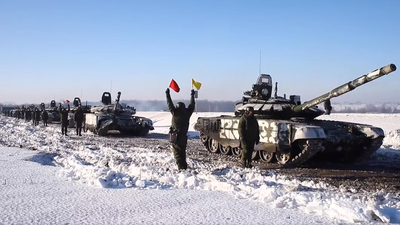Ukraine has warned Britain that it risks offending its Nato allies after the Defence Secretary compared Western diplomatic efforts to avert a Russian invasion to the appeasement of Germany before the Second World War.
Mason Boycott-Owen The Telegraph
14 February 2022
© Provided by The Telegraph Ben Wallace attending a meeting at the Russian Defence Ministry on FridayBen Wallace said on Sunday that there is a "whiff of Munich in the air", in a reference to the agreement that allowed German annexation of the Sudetenland in 1938 but failed to prevent the Second World War.
Vadym Prystaiko, Ukraine’s ambassador to the UK, warned on Sunday that the panic being caused by the West sounding the alarm could be playing into Vladimir Putin's hands.
"It's not the best time for us to offend our partners in the world, reminding them of this act which actually [did not bring] peace but the opposite, it brought war," the diplomat told BBC Radio 4's Broadcasting House programme.
"There's panic everywhere, not just in people's minds but in financial markets as well," he added, warning it is "hurting the Ukrainian economy on sort of the same level as people leaving the embassy".
It comes as Mr Wallace cut short an overseas holiday with his family so he could be “back in play” to deal with the worsening crisis in Ukraine.
Mr Wallace flew abroad for the holiday after talks in Moscow on Friday. However, he returned to the UK on Saturday, so he could prepare for upcoming meetings with Nato defence ministers.
A senior defence source said that Mr Wallace was not asked to return to the UK, but that it was “his call” so he can “crack on with what needs to be done”. The location of the holiday could not be disclosed for security reasons.
Volodymyr Zelensky, the Ukrainian president, sought to downplay the threat of invasion, saying: "The best friend of our enemies is panic in our country. And all this information is just provoking panic and can't help us."
A source explained that Mr Wallace's concern is that if Mr Putin strikes "come what may, then all the diplomacy would have been a straw man".
Mr Wallace is understood to have meant that if Moscow pushes ahead with an invasion, many in the West will have repeated the mistake of Munich by engaging in diplomacy in good faith, while Mr Putin will have been disingenuous all along.
Mr Wallace said in an interview with The Sunday Times that Moscow could "launch an offensive at any time", with an estimated 130,000 Russian troops and heavy firepower massed along Ukraine's border.
© Provided by The Telegraph Ukraine Invasion Map"It may be that he (Putin) just switches off his tanks and we all go home but there is a whiff of Munich in the air from some in the West," he added.
Brandon Lewis, the Northern Ireland Secretary, defended Mr Wallace’s comments, saying that an imminent attack was "entirely possible" and that the Defence Secretary was not criticising Nato allies for their approach towards Russia.
Mr Lewis said it showed that diplomacy could prevent European conflict, adding: "If you look back to that period of time there was a lot of diplomatic engagement, there was an optimism at the time actually that there may be a diplomatic way through.
"It turned out that wasn't the intent or aim of Adolf Hitler at the time."
The Northern Ireland Secretary told the BBC: "What he's drawing comparison with is we hope that the conversation that he's had ... has a positive outcome and Russia does work through and find a diplomatic peaceful way out of this.
"But he's expressing that concern that we've got to also understand the reality that while they're having these diplomatic conversations, Russia has continued to move troops. We've got about 130,000 troops on the borders and therefore we've got to be cognisant of the reality that they could move very quick."
He told Sky News: "I think what the Defence Secretary quite rightly was doing is drawing the comparison and being clear there's a lot of diplomatic work going on ... the Russian state is saying that it is not planning to invade, but when you have 100,000, now 130,000, we estimate, troops on the border that would indicate there's a possibility of an incursion.
"It's that balance and that decision and that interpretation of the difference of what we hope will be a diplomatic outcome but a realistic possibility that something much more tragic could occur."


